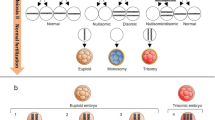Abstract
The screening of in vitro embryos resulting from in vitro fertilization (IVF) treatment for chromosomal abnormalities (aneuploidies) has as a primary aim to help patients achieve a successful pregnancy. Most IVF centers will not transfer aneuploid embryos, as they have an enhanced risk of leading to implantation failure and miscarriage. However, some aneuploidies, such as trisomy-21, can lead to viable pregnancies and to children with a variable health prognosis, and some prospective parents may request transfer of such embryos. I present two cases where the testing for and detection of trisomy-21 can lead to conflicts between IVF professionals and patients and argue that in most such cases respect for choices of patients should prevail.
Similar content being viewed by others
References
de Wert, G. (1999). Ethics of assisted reproduction. In B. C. J. M. Fauser (Ed.), Molecular biology in reproductive medicine (pp. 433–448). New York: Parthenon.
Draper, H., & Chadwick, R. (1999). Beware! Preimplantation genetic diagnosis may solve some old problems but it also raises new ones. Journal of Medical Ethics, 25, 114–120.
Edwards, S. D. (2001). Prevention of disability on grounds of suffering. Journal of Medical Ethics, 27, 380–382.
Gavaghan, C. (2007). Defending the genetic supermarket: Law and ethics of selecting the next generation. London: Routledge-Cavendish.
Harris, J. (2000). Is there a coherent social conception of disability? Journal of Medical Ethics, 26, 95–100.
Hens, K., Dondorp, W., Handyside, A. H., Harper, J., Newson, A. J., Pennings, G., et al. (2013). Dynamics and ethics of comprehensive preimplantation genetic testing: A review of the challenges. Human Reproduction Update, 19, 366–375.
Hens, K., Dondorp, W. J., Geraedts, J. P., & de Wert, G. M. (2013). Comprehensive embryo testing. Experts’ opinions regarding future directions: An expert panel study on comprehensive embryo testing. Human Reproduction, 28, 1418–1425.
Morris, J. K., Wald, N. J., & Watt, H. C. (1999). Fetal loss in Down syndrome pregnancies. Prenatal Diagnosis, 19, 142–145.
Pennings, G., & de Wert, G. (2003). Evolving ethics in medically assisted reproduction. Human Reproduction Update, 9, 397–404.
Pennings, G., de Wert, G., Shenfield, F., Cohen, J., Tarlatzis, B., & Devroey, P. (2007). ESHRE task force on ethics and law 13: The welfare of the child in medically assisted reproduction. Human Reproduction, 22, 2585–2588.
Pieters, J. J., Kooper, A. J., van Kessel, A. G., Braat, D. D., & Smits, A. P. (2011). Incidental prenatal diagnosis of sex chromosome aneuploidies: Health, behavior, and fertility. ISRN Obstetrics and Gynecology, 2011, 807106.
Robertson, J. A. (1996). Children of choice. Freedom and the new reproductive technologies. Princeton: Princeton University Press.
Roizen, N. J., & Patterson, D. (2003). Down’s syndrome. The Lancet, 361, 1281–1289.
Savulescu, J. (2007). In defence of procreative beneficence. Journal of Medical Ethics, 33, 284–288.
Savulescu, J. (2001). Procreative beneficence: Why we should select the best children. Bioethics, 15, 413–426.
Savulescu, J., & Kahane, G. (2009). The moral obligation to create children with the best chance of the best life. Bioethics, 23, 274–290.
Skotko, B. G., & Levine, S. P. (2006). What the other children are thinking: Brothers and sisters of persons with Down syndrome. American Journal of Medical Genetics. Part C, Seminars in Medical Genetics, 142C, 180–186.
Skotko, B. G., Levine, S. P., & Goldstein, R. (2011). Having a son or daughter with Down syndrome: Perspectives from mothers and fathers. American Journal of Medical Genetics. Part A, 155A, 2335–2347.
Skotko, B. G., Levine, S. P., & Goldstein, R. (2011). Self-perceptions from people with Down syndrome. American Journal of Medical Genetics. Part A, 155A, 2360–2369.
Sybert, V. P., & McCauley, E. (2004). Turner’s syndrome. New England Journal of Medicine, 351, 1227–1238.
Acknowledgments
This work was supported by the Centre for Society and Life Sciences (Project Number: 70.1.074). I would like to thank Daniela Cutas, Wybo Dondorp, Guido de Wert, Inge Liebaers and the anonymous reviewers for their valuable comments.
Author information
Authors and Affiliations
Corresponding author
Rights and permissions
About this article
Cite this article
Hens, K. To Transfer or Not to Transfer: The Case of Comprehensive Chromosome Screening of the In Vitro Embryo. Health Care Anal 23, 197–206 (2015). https://doi.org/10.1007/s10728-013-0259-y
Published:
Issue Date:
DOI: https://doi.org/10.1007/s10728-013-0259-y




